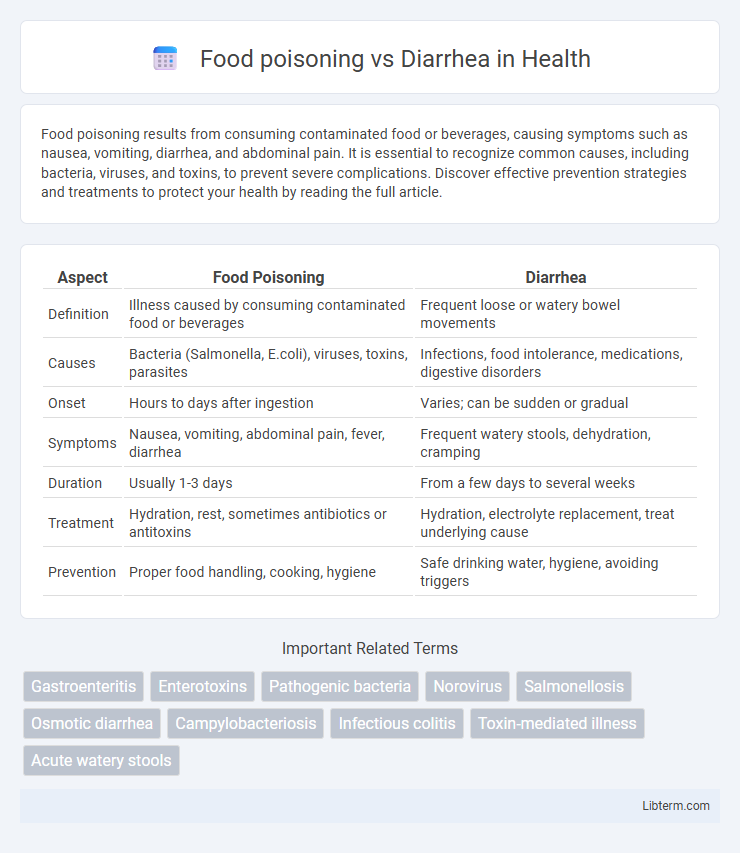Food poisoning results from consuming contaminated food or beverages, causing symptoms such as nausea, vomiting, diarrhea, and abdominal pain. It is essential to recognize common causes, including bacteria, viruses, and toxins, to prevent severe complications. Discover effective prevention strategies and treatments to protect your health by reading the full article.
Table of Comparison
| Aspect | Food Poisoning | Diarrhea |
|---|---|---|
| Definition | Illness caused by consuming contaminated food or beverages | Frequent loose or watery bowel movements |
| Causes | Bacteria (Salmonella, E.coli), viruses, toxins, parasites | Infections, food intolerance, medications, digestive disorders |
| Onset | Hours to days after ingestion | Varies; can be sudden or gradual |
| Symptoms | Nausea, vomiting, abdominal pain, fever, diarrhea | Frequent watery stools, dehydration, cramping |
| Duration | Usually 1-3 days | From a few days to several weeks |
| Treatment | Hydration, rest, sometimes antibiotics or antitoxins | Hydration, electrolyte replacement, treat underlying cause |
| Prevention | Proper food handling, cooking, hygiene | Safe drinking water, hygiene, avoiding triggers |
Understanding Food Poisoning and Diarrhea
Food poisoning results from consuming contaminated food containing harmful bacteria, viruses, or toxins, causing symptoms such as nausea, vomiting, and abdominal cramps. Diarrhea, characterized by frequent loose or watery stools, often occurs as a symptom of food poisoning but can also result from infections, medications, or underlying health conditions. Understanding the differences helps in timely diagnosis and treatment, emphasizing hydration and medical care for severe cases.
Key Differences Between Food Poisoning and Diarrhea
Food poisoning results from consuming contaminated food containing harmful bacteria, viruses, or toxins, often causing symptoms like nausea, vomiting, and fever alongside diarrhea. Diarrhea is a symptom characterized by frequent, loose stools that can arise from various causes including infections, food intolerances, or chronic diseases. Unlike diarrhea, food poisoning specifically originates from ingesting contaminated substances and typically has a rapid onset with additional systemic symptoms.
Common Causes of Food Poisoning
Food poisoning commonly results from consuming contaminated foods containing bacteria such as Salmonella, E. coli, and Listeria, as well as viruses like norovirus. Poor hygiene, improper food handling, undercooked meats, and unpasteurized dairy products increase the risk of ingesting harmful pathogens. Unlike diarrhea, which is a symptom that can arise from various conditions, food poisoning specifically stems from ingesting toxins or infectious agents in spoiled or unsafe food.
Typical Causes of Diarrhea
Typical causes of diarrhea include infections from bacteria such as Escherichia coli, Salmonella, and Campylobacter, as well as viruses like norovirus and rotavirus. Food poisoning often results from consuming contaminated food or water containing these pathogens or toxins, leading to symptoms including diarrhea. Other causes include parasitic infections, medication side effects, and chronic conditions like irritable bowel syndrome or inflammatory bowel disease.
Symptoms: Food Poisoning vs. Diarrhea
Food poisoning symptoms often include nausea, vomiting, abdominal cramps, and fever, whereas diarrhea primarily involves frequent, loose, or watery stools with possible abdominal discomfort. In food poisoning, symptoms typically appear quickly within hours after consuming contaminated food, while diarrhea can result from various causes, including infections, and may last longer. Recognizing these symptom differences is crucial for accurate diagnosis and effective treatment.
How Each Condition is Diagnosed
Food poisoning is diagnosed through a combination of patient history, symptom assessment, and laboratory tests such as stool cultures to identify bacterial, viral, or parasitic pathogens. Diarrhea diagnosis involves analyzing stool samples to detect infections, malabsorption issues, or inflammatory markers, along with blood tests and sometimes endoscopy to pinpoint underlying conditions. Accurate diagnosis for both conditions relies heavily on identifying specific causative agents and correlating clinical symptoms with laboratory findings.
Treatment Options for Food Poisoning
Treatment options for food poisoning primarily include rehydration with electrolytes to prevent dehydration and rest to support the immune system. In severe cases, medical intervention may involve antibiotics or anti-nausea medications prescribed based on the specific bacterial or parasitic cause. Over-the-counter remedies are generally avoided unless recommended by healthcare professionals, as improper use can worsen symptoms or delay recovery.
Managing and Treating Diarrhea
Managing and treating diarrhea involves maintaining hydration through oral rehydration solutions or electrolyte-rich fluids to prevent dehydration. Consuming a bland diet with foods like bananas, rice, applesauce, and toast (BRAT diet) can help soothe the digestive system. Avoiding dairy, caffeine, and fatty or spicy foods supports recovery while over-the-counter anti-diarrheal medications may be used cautiously under medical guidance.
Prevention Tips for Both Conditions
Preventing food poisoning and diarrhea involves maintaining strict food hygiene, such as thoroughly cooking meat, washing fruits and vegetables, and avoiding cross-contamination. Regular handwashing with soap, especially before meals and after using the restroom, significantly reduces the risk of infection from pathogens like Salmonella, E. coli, and norovirus. Staying hydrated with clean water and avoiding consumption of contaminated food or water sources are essential steps to minimize the occurrence of both foodborne illnesses and diarrheal diseases.
When to Seek Medical Attention
Seek medical attention for food poisoning if experiencing high fever above 101.5degF, persistent vomiting lasting more than 24 hours, signs of dehydration, or blood in stool. Diarrhea warrants medical evaluation when it lasts more than two days, is accompanied by severe abdominal pain, dehydration symptoms, or if occurring in infants, elderly, or immunocompromised individuals. Prompt medical care is crucial to prevent complications and ensure appropriate treatment tailored to the underlying cause.
Food poisoning Infographic

 libterm.com
libterm.com